CIA Torture Report Details Millions In Government Spending On 'Wish Lists,' Employee Rewards And Gifts To Foreign Governments
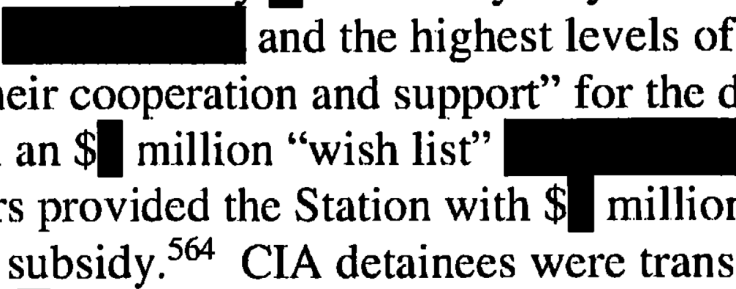
The CIA’s Detention and Interrogation Program cost hundreds of million dollars to operate, according to the Senate committee report released Tuesday. And in many cases, the CIA spared no expense, telling its officers to make “wish lists” of what they needed to complete their work, and reminding them to “think big.”
At one point, a field agent told headquarters that his office had “more money than we could possibly spend,” noting one incident in which he and another officer gave out boxes filled with hundred-dollar bills to an unidentified recipient.
He noted that he never counted it. “I’m not about to count that kind of money for a receipt.”

Many of the dollar figures in the report have been redacted, and those that remain are preceded by phrases such as “well over” or “more than.” The information does show the various ways the CIA spent money on the program, which ranged from building facilities to legal fees to “gifts” for foreign countries, as well as compensation for the performance of specific interrogation techniques.
Here’s how some of the program's money was spent, according to the report.
Building Costs
At the very beginning, the report says the CIA spent “well over $300 million,” not including costs of paying its employees.
“We can never have enough blacksite hosts,” one officer is quoted as saying later in the report.
This spending helped fund the building of facilities in various unnamed countries around the world, including some that were never used.

There are few details about specific sites. For instance, the report shows the CIA spent $200,000 in 2002 to construct “DETENTION SITE COBALT,” which looks to be the “Salt Pit” site outside Kabul where suspected Afghan militant Gul Rahman was killed. The money paid for amenities like blacked-out windows, “buckets for human waste,” and four cells with a bar across the top where detainees were shackled with their hands above their heads.
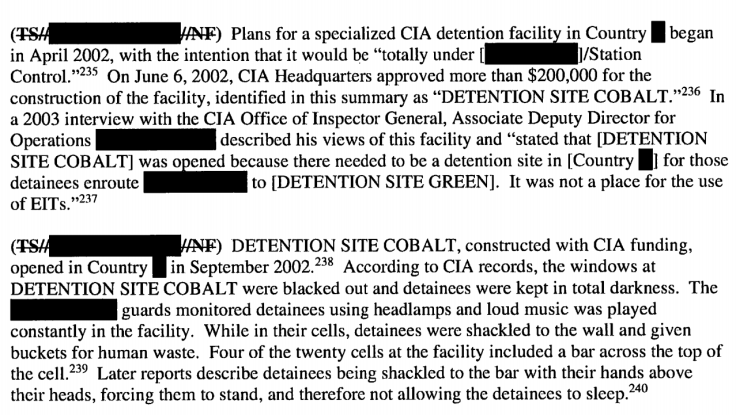
One facility that cost at least $1 million to build was described as the “aborted” project. The site was closed in 2006 due to the “absence of adequate emergency medical care options,” despite the high amount spent on the place.


Outsourcing
The CIA’s “Detention and Interrogation Program” was created by two psychologists on contract. While they had experience at the U.S. Air Force Survival, Evasion, Resistance and Escape (SERE) school, they had never worked as interrogators and didn't have a background in terrorism. Nevertheless, they designed most of the methods used -- and they personally interrogated “some of the CIA’s most significant detainees.”
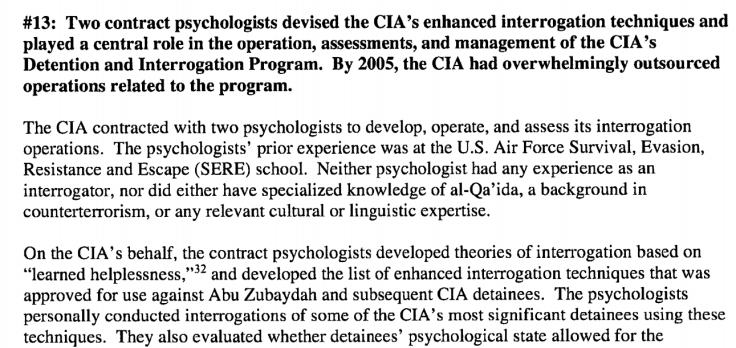
In 2005, the psychologists formed their own company expressly to work with the CIA. They had a contract with the agency valued higher than $180 million, which was terminated before it was fulfilled in 2009. By 2008, roughly 85 percent of program's staff were contractors from this company.

The report names the company heads under the pseudonyms Grayson Swigert and Hammond Dunbar. The two received $1.5 million and $1.1 million, respectively, when their contract ended in 2009.
Funding for Foreign Governments
The report also notes that the CIA gave foreign governments millions in cash to “increase support” for its existing sites. The agency encouraged its stations to, again. "think big” when asking for financial assistance from foreign governments.

This financial assistance helped smooth over disagreements between host countries. In one instance, a country that had hosted a CIA site began rejecting inmates but then reversed its decision soon after a CIA “gift” of a redacted amount of millions.
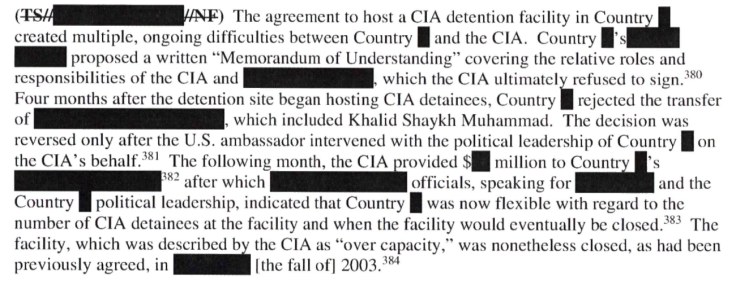

In 2003, the report shows that a CIA station in one country provided a “wish list” worth millions, and the CIA provided them with more than they asked for.
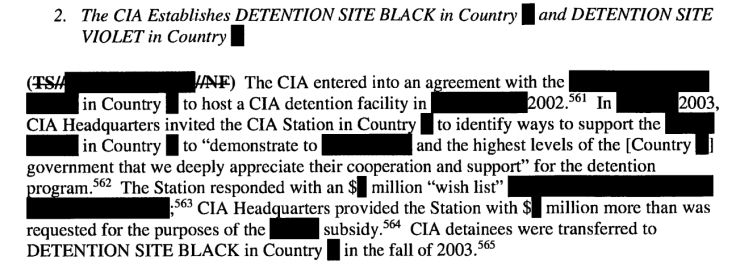
In another heavily redacted paragraph, the agency offered another million-dollar gift to “show appreciation” for a country’s support of the program. At one point, a local station chief commented that the CIA could “buy” a country for a certain amount.

That same year, CIA officers were providing millions in “subsidies” to a handful of countries, and told them to -- you guessed it --“think big” about their support requirements. The exact details have been redacted.

Incentives
In at least one case, an officer received a "cash reward" of $2,500 for “consistently superior work.”
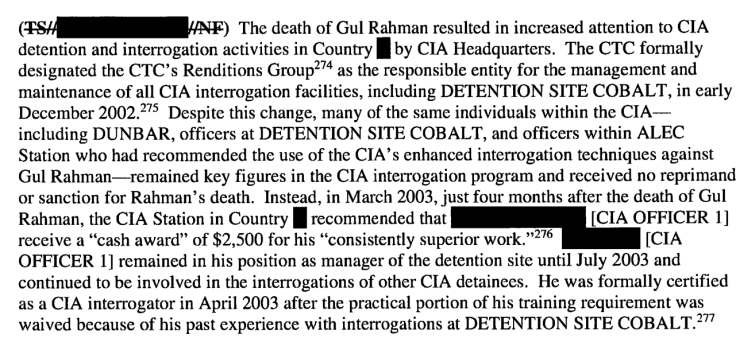
The report also details how the office of medical services (OMS) raised concerns that certain interrogators advocated for the use of a certain kind of enhanced interrogation technique (EIT) that earned them $1,800 per day -- four times what their counterparts, who could not use this technique, were making. This caused concern about a possible “conflict of interest.”
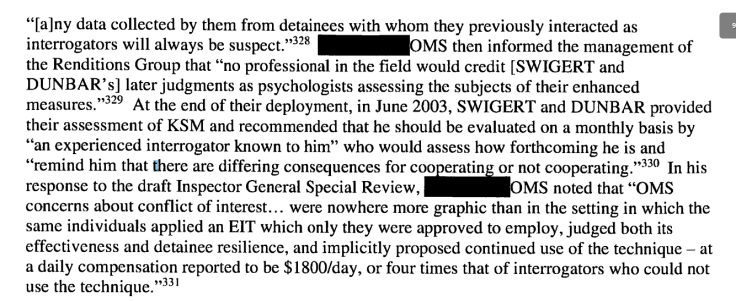
Prisoner Payments
The report shows that some detainees who were released also received some payments “for having been held in detention.” These include Sayed Habib, Modin Nik Mohammed and Ali Saeed Awadh.


Another page details how in 2004 CIA officers sent one prisoner, Khalid al-Masri, toward a “fake border crossing,” and provided him with $17,000 (roughly 14,500 euros.)

Medical Bills
The report further details how the CIA paid three “third-party” countries at least $1 million to treat one detainee, Mustafa Ahmad al-Hawasawi. Local officers were reluctant to take him to a local hospital in light of recent media reports, it says.

Legal Issues
By the time the CIA terminated its contract with “Company Y” in 2009, it had paid more than $75 million for its services. This included a payment of $570,000 in 2008 after the company had incurred costs for “conducting countersurveillance” on its employees after what seems like a press leak.
The CIA also had a $5 million contract with "Company Y" that covered criminal prosecution and other expenses. In 2007 it hired a “prominent” law firm in a deal that cost the CIA $1.1 million from 2007 to 2012 and obligates the agency to pay further expenses until 2021. The company also received $612,000 in 2010 for “contract close-out costs.”
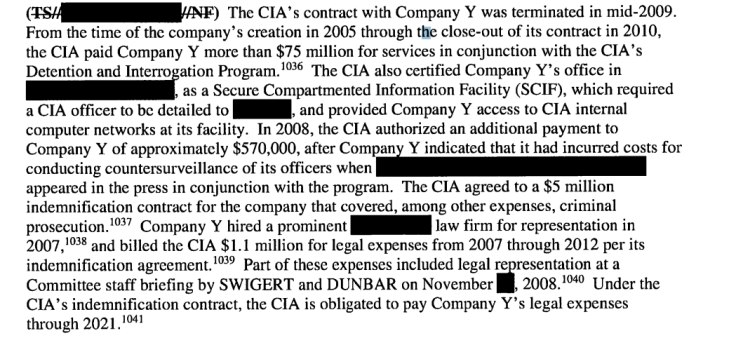
© Copyright IBTimes 2024. All rights reserved.





















